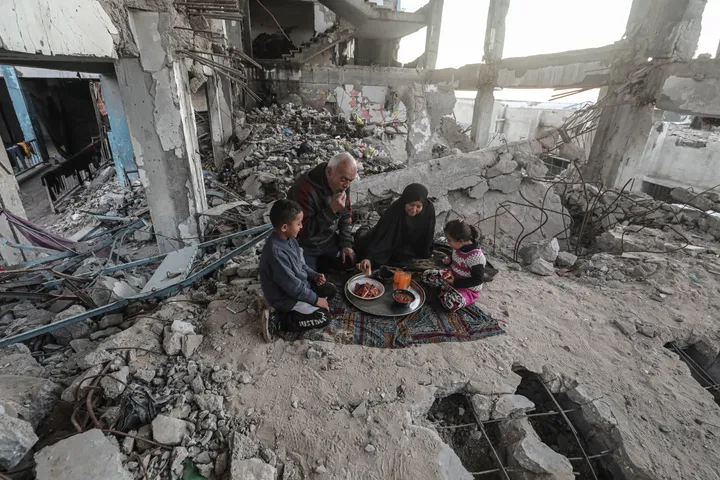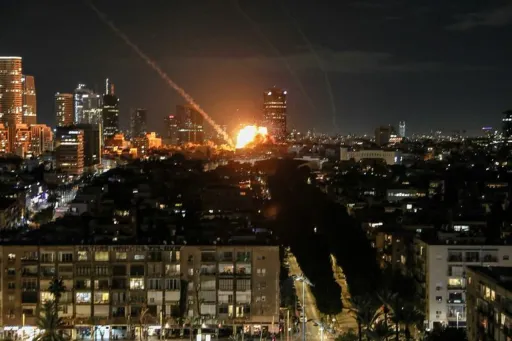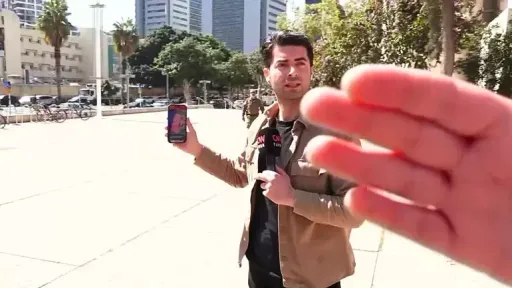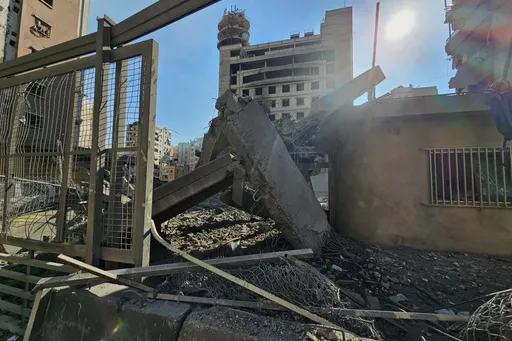I was born in Gaza nearly 40 years ago. I remember having a happy early childhood. My father used to take us on trips to different parts of Palestine, exploring nature and religious sites. I wasn't exactly a naughty child, but I recall my mother always asking me to sit down when the bus passed through mountainous roads and green fields. I would always put both my hands on the bus window and gaze outside.
I still recall spontaneously playing with Jewish children in a public park. Both my parents and the parents of the other children observed from afar as we innocently played. Perhaps, for them, it was a glimpse of hope for coexistence and living together.
My father was a teacher and established a learning institute called 'Salam,' an Arabic word that means 'peace'. He planned trips from Gaza to Jerusalem and sometimes other parts of Palestine, either monthly or weekly.
In 1987, the first Intifada started, and the number of these trips reduced. What I recall during the years of the Intifada is the increase in the number of checkpoints and search points by Israeli soldiers.
The Erez crossing was the main gateway for Palestinians to the outside world. I remember when it was just a few soldiers stopping our car, looking inside, or opening the trunk for a search. Then, year after year, it evolved into a sophisticated terminal with various searching equipment. Eventually, Palestinian cars were no longer allowed to cross.
The little hope for coexistence started to fade away as more and more walls and barriers were constructed by the Israelis, even inside Gaza City. These barriers were ugly, blocking major streets and cutting off neighbourhoods.
During the First Intifada, Israeli soldiers imposed many curfews. Sometimes, these curfews were only for men, with only women and children allowed to go out. As the youngest in the family, I used to accompany my mother to buy daily necessities.
Gun’s muzzle in my head
On other days, curfews were imposed on everyone—elderly, women, children, and men. I remember one particularly dull day when the children in my neighbourhood decided to play football in a narrow, hidden street. They believed that Israeli soldiers wouldn't see them.
At that time, my father advised the children not to make noise and to play only in the secluded part of the town, away from the main road where Israeli military vehicles typically patrolled.
As children, the football match was intense, and we couldn't resist celebrating the first goal. Our shouts and cheers echoed through the air.
Bad luck! The moment we celebrated the goal was exactly when an Israeli patrol passed the main road. We all heard the sound of the military vehicle entering our street. The children and teenagers started running, climbing over walls, or rushing into their homes. Some boys hid behind walls. I was too young and couldn’t run fast or hide properly. I tried to hide behind a tree, but it seemed the tree didn't conceal me well enough.
I was hiding and lowering my head. When I raised my head, I found a gun pointed at me by an Israeli soldier who asked, 'Where is your home?' With trembling lips, I answered, 'Here!' The soldier shouted in broken Arabic, 'rookh, rookh!' which means 'Go, go!'
Now, after three decades, I still can't forget the M16's muzzle pointed just two inches from my eyes.
I was around six years old at that time. The soldiers were occupied with older children. As I ran towards my home, I witnessed other Israeli forces catching and beating teenagers.
Many neighbourhood boys were arrested that day, and parents later went to free them from Israeli prisons, trying to convince the authorities that they were just children playing outside after being besieged in their homes for many days due to tight curfews. Parents even paid fines to secure the release of their children.
In 1994, after the Oslo Agreement, a new chapter began for me as a more conscious child. There were no more Israeli soldiers in the streets of Gaza, no curfews, and we could stay outdoors after 9:00 pm.
It felt like more freedom, although Israeli control remained at the borders and checkpoints, primarily between towns and cities in Gaza rather than inside the urban centres. Illegal settlements still existed in many parts of the tiny enclave.
Finally, we could play football in the neighbourhood and stay outdoors until a little later.
A dream pending Israeli approval
I later realised that revisiting the places we went to during and before the Intifada became more challenging. My family needed permits to go to Jerusalem and pray at the Al Aqsa Mosque.
The trips and picnics, once regular in Jerusalem, now felt like a dream pending approval from the Israelis. Nonetheless, we found solace in the limited freedom within what was starting to feel like a large prison called Gaza.
In 1999, my family and I travelled by plane from the Gaza International Airport to Egypt. It was my first time on an aircraft, and it remains one of the happiest moments of my life—boarding a Palestinian Airlines flight. My father promised that we would travel every year.
Before turning 18, I insisted to my parents that I wanted to visit the Al Aqsa Mosque one last time. After waiting a few weeks, we obtained permits and travelled through the Erez crossing again. However, this time, the crossing was vastly different from the ones I experienced in my childhood.
I underwent a body search by a female Israeli soldier who instructed me to remove most of my clothes. It was a humiliating experience.
I felt relief when I reached the Al Aqsa compound and started to see the mosque slowly emerging as I walked through the trees. Praying in this beautiful Islamic site is such an uplifting experience.
Second Intifada and loss of Palestinian leaders
On September 28, 2000, the Second Intifada started following Ariel Sharon's visit to the Al Aqsa Mosque compound. Sharon was an right-wing opposition leader who, in 1982, was the Israeli defence minister involved in the massacre of Palestinian refugees in the Sabra and Shatila camps in Beirut.
Sharon’s visit to Al Aqsa sparked anger among Palestinians, who felt that the visit of a criminal was a desecration of an Islamic holy site. Sharon became Israel’s prime minister the next year. More restrictions were imposed on Palestinians. Gaza International Airport was destroyed. The construction of the apartheid separation wall in the occupied West Bank started in 2002. I was just a student then.
In 2002, Palestinian leader Yasser Arafat was besieged in his compound in Ramallah. Israeli forces confined him to his headquarters, the Muqataa. In November 2004, Arafat passed away. Many reports and some Palestinian officials say he was poisoned.
In 2005, Sharon orchestrated what was known as the Israeli ‘Gaza disengagement’, dismantling illegal Jewish settlements in response to Palestinian resistance against them. Internationally, it was perceived as an Israeli withdrawal during the early years of the Second Intifada. It wasn’t a withdrawal, as Israel still controlled Gaza’s land, sea and sky.
Palestinians didn’t only lose Arafat but also other Palestinian figures who were killed by Israel – such as Abu Ali Mustafa, Secretary-General of the Popular Front for the Liberation of Palestine (PFLP) and Sheikh Ahmed Yassin, founder and spiritual leader of Hamas. Yassin, a disabled person, was shot at and killed by an Israeli Apache while he was on his way to the mosque early morning. I remember hearing about the air strike.
Hamas elected, takes over Gaza administration
In 2006, Palestinians held parliamentary elections overseen by international and national committees. The elections were widely considered free and fair, leading to the Palestinian resistance movement Hamas coming to power.
Israel and its allies went ballistic over Hamas’ rise to power. The quartet on the Middle East – including the United States, the European Union, the United Kingdom – demanded that Hamas recognise Israel, renounce violence and accept previous agreements made between Israel and the Palestine Liberation Organization (PLO).
Hamas didn’t accept these conditions and emphasised that it was a resistance movement that came by the will of the Palestinian people.
The situation deteriorated for the people in Gaza, and I remember the chaos that ensued – triggered by different armed groups that we didn’t know exactly well – between 2006 and mid-2007.
A gun pointed at me again
I remember another time in my life when a gun was pointed at me by gunmen in a van while I was walking home from college. They were laughing at me. Had those gunmen killed me, no one would have known who they were.
Even if we complained about such gunmen or other law-and-order incidents, the police didn’t respond. One of the reasons, I remember, was the police force always ran short on fuel for their vehicles. They were barely able to arrive on the crime spot and investigate such incidents.
In June 2007, Hamas took control of Gaza’s security. Their fighters manned police stations and security sites.
A year later, Israel waged yet another war on Gaza.
Israeli warplanes bombed a police graduation ceremony. I was near Al Shifa hospital at that time, and I saw tens of bodies being brought into the hospital.
I witnessed bodies lying in a row on the ground outside the building due to the hospital’s limited capacity. During this brutal war, I was involved in humanitarian work and documented much of what I witnessed in a blog.
I worked for several years in the relief and humanitarian sector, mostly documenting personal stories or taking part in emergency interventions, such as providing aid supplies and psychosocial support.
This experience, especially during the wars in Gaza in 2012 and 2014, along with other military escalations, has significantly shaped my life. It made me witness so much injustice against innocent civilians, especially children who didn’t do anything except be born on this spot on earth.
In 2020, I decided to pursue my education in Türkiye. Israeli brutality continued against Gaza over and over again. One of the major wars that devastated my city was in 2021. Ever since I moved to Istanbul, I haven’t returned home. Away from Gaza, here in Istanbul, where I work now, I try to distract myself from the injustices Palestinians are facing but I can’t. My heart continues to be in Gaza.
October 7, 2023
Every year and during each war, I have lost friends and relatives in Israeli attacks. Now, in the ongoing war that started on October 7 last year, I am not only losing a friend or a relative; entire families are being wiped out.
One of these friends was Ameed, a very gentle and kind man with whom I used to play tennis at a sports club in Gaza. His entire family has been lost in this war, including his little, cute girls who used to help us by collecting tennis balls while playfully running around the tennis court. I can’t believe these angels are gone.
As the war intensified and Israel started a ground invasion, military tanks began to get closer and closer to my home in Gaza. My family evacuated and went to the southern part of the enclave following Israeli instructions. But the promise of a safe haven turned out to be a lie as Israel continued attacking civilians everywhere, north and south.
I came to know that the Israeli forces broke into my house, located near Al Shifa hospital.
A friend of mine, Mohamed Sawir, who had not evacuated from north Gaza, went to check on my home after the withdrawal of Israeli soldiers from the area.
Mohamed sent some photos of my house and told me how the Israeli soldiers vandalised my home. They tore apart many personal documents and certificates.
After using my home to rest and recuperate between their killing sprees, the occupation soldiers urinated inside the fridges and destroyed photos of my children with knives.
A few days later, however, Mohamed was forced to evacuate his home as the Israeli attacks intensified. Then he heard of a strike hitting his home. When he went to check out his house, an Israeli sniper shot him in the head.
Mohamed was the father of a one-year-old girl who just became one of the hundreds of unfortunate orphans in this war.
Mother’s resilience
One of the most important people in my life is my mother, Majida. She was born in 1947, just before the Nakba, when Israel expelled hundreds of thousands of Palestinians from homes and villages. My grandparents took my mother, aunts and uncles from Al Majdal near Gaza toward Gaza City.
She has survived many wars since then, enduring numerous injustices imposed by the Israeli occupation since her early childhood.
For my mother, this ongoing war by Israel is the toughest. She has once again been displaced from her home and is now living in a crowded house with relatives in the southern part of Gaza.
Before the war, I used to speak with my mother almost daily during my commute. Talking with her now is extremely hard due to her exhaustion and telecommunication interruptions.
She suffers from many illnesses, and it has become difficult to find her the proper medication. Two weeks ago, her health deteriorated, and she had to go to hospital.
My brother managed to call the emergency services, but an ambulance couldn't reach her due to the intensification of Israeli attacks. She suffered from breathing difficulties for hours until the next day when an ambulance finally came to take her to the hospital. The doctors recommended a 24-hour observation period but informed her that she had to bring her mattress as there weren't enough beds available. Thankfully, she survived this illness, and her condition has improved somewhat. However, many medications are still not available.
I still can’t reach her via phone calls. But whenever my siblings manage to get a connection, they update me via text messages about her health condition and themselves.
Though far from my family and hometown, I can't find peace. The constant fear of losing loved ones takes a toll on me. I receive news of losing friends, neighbours and former colleagues every other day.
When I connect with my loved ones through phone or social media, the devastating stories of their survival amidst bombardment leave me in despair.
In the heart of Gaza, my nephew was searching for food in the Nusairat market when he left minutes before an air strike hit, claiming many lives. He told me, “I feel death is so close.” Miraculously, he survived. The loss of innocent lives, whether in their tents or while seeking aid, saddens me deeply.
Creativity and adaptability
What is special about the people of Gaza is their resilience and love for life. They continually seek alternatives, adapting to challenges. When Israel bombed bakeries, Palestinians crafted mud ovens to bake their bread.
When food items ran out in the market, they ingeniously created new dishes, incorporating wild plants like khobaiza, which grows in Gaza's soil during the winter months, into delicious meals.
When Israel bombed one route, they discovered new paths for evacuation. In the face of a war impacting every child, they initiated fun and creative activities, including music and recreational programmes, despite the prevailing fear.
The aim was to minimise the trauma experienced by the children. I have never witnessed such determination for survival—whether it's finding alternative routes, creating recreational activities for kids, ensuring connection, adapting diets, or securing medications.
Sometimes, a sense of helplessness overwhelms me when I think about my friends and family still in Gaza. What brings me hope and strength is hearing their voices when I manage to call them.
Their voices resonate with strength, and their unwavering belief is truly inspiring.
Despite the underlying fear, their trust in their Creator and the profound peace in my mother's heart leave me speechless.
As the Holy month of Ramadan approaches, even amidst displacement, we see many families and children adorning their tents and the surroundings, creating a festive and spiritual atmosphere.
Such shared commitment to life despite all that my people are going through reminds me of a poem titled "On This Earth, What Is Worth Living For" by renowned Palestinian poet Mahmoud Darwish:
"And we love life if we find a way to it,
And we extol the darkness with our stars,
And we turn deserts into oases.
And we love life if we find a way to it."























